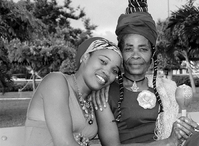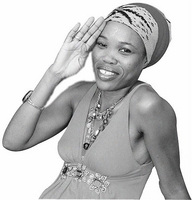'Lioness on the rise' - Queen Ifrica ... Music, Message, Mission!
Published: Sunday | August 30, 2009

Queen Ifrica and her mom Ivarine 'Mama Itah' Walsh. - - Colin Hamilton/Freelance Photographer
Queen Ifrica has been in the spotlight a lot these days from promoting her debut VP Records release, Montego Bay, to voicing her forthright and unwavering stance against a lot of what is happening in the entertainment industry and popular culture in Jamaica and her assessment of how it affects the diaspora.

Queen Ifrica is a tiny woman, but her passion is gargantuan. She is passionate about the condition of the psyche of today's youths and Jamaican society in general. However, she is quick to state that, "I can never truly point blame at the young people, because children truly live what they learn and parents in the household must take back their attention from the vanities that are set up there for them ... morals was always in the mix also, but now it is at the point where we have to go directly to young people and let them know that you have the power of choice in your hand," she states emphatically.
"All of my doings are in want of a better world, social work, understanding self," says Queen Ifrica, who confides that if she were not involved in the music industry, she would be involved in some form of social work. Many of her songs are social commentaries, which she states is absolutely intentional.
humanitarian
"I don't know if it's because of my nature, but I see myself as a humanitarian, not because it gives you points or anything," she says, "it's just how I feel ... if you listen to my music I don't sing because I can write, I sing from the heart and it comes across that way to the people that come in contact with the music ... their reaction, always saying you are sincere and we feel what you are saying and we understand ... it's congrats and keep up the good work and don't stop what you're doing." .
Queen Ifrica says she wants to highlight the reality that in order for her and others like her to continue doing what they are doing they need support from those who have the wherewithal to support this music.
"The people who are influential and could help in making it more visible to the people that it needs to get to are the people who tend to stand off and not necessarily support this aspect of the music," she says.
Getting more specific, Queen Ifrica asserts that "if you have an artiste that is singing about sex all the time ... what it is to have four girls, to drink and go home and have sex, then definitely it is easy to merge this type of message with a product that you are trying to sell." She quickly invited the contrast with "an artiste like myself who is about self-awareness, trying to tell people that it doesn't matter where you live or what circumstances you live in, if you learn to love yourself and respect yourself, then you won't need to turn to alcohol and other mediums to find comfort."
why is sex okay
She insists that young people need to learn to trust themselves. "When someone comes to you and tells you that it's okay to have sex, it's okay to ask them why is it okay, as opposed to thinking that because they are saying it so convincingly it means that it must be that way. You have a right to ask a question," says the budding queen of roots, rock, reggae.
Taking no prisoners, Queen says, "Media today and a lot of products are aimed at our young people from age 6 to 18. When you check the products that are aimed at these young people, it's alcohol, it's sexual aphrodisiacs, it's condoms, it's party as you feel, it's bleach if you want to, it's tattoo your skin if you want to and then there is no opposition as if there isn't another option ... this is the only thing coming to them.
"Parents ... I do come back to that, parents have a big role to play in how they monitor these households with these youths," she cautions, "Parents must be mindful of the things that are coming into these households, into their private spaces. It's legalised pornography and they are hiding it under the guise of freedom of speech and freedom of expression," says an anxious Queen, "In Jamaica, we have the most sex and massage shops ... when you look in the paper now, you see it evident, there are several pages advertising sexual massages and it's aimed at the 18 and over ... I am wondering now, where do they get all these young people to be partaking in these things on such a small island as Jamaica?"
700 missing children
Queen Ifrica was on a roll, sighting data about the increased number of missing and murdered children in Jamaica. "We have over 700 missing children, girls mostly and they cannot be found in a small island ... there used to be this panic when old people, or young people or women were killed, now it's the norm and when you listen to a lot of the lyrics that are being played and are being hyped, that is the message that's being sent." She mimics some popular dancehall lyrics saying, "You kill baby pon breast, you kill woman when she pregnant, shoot out baby outta belly ... these are the lyrics that are being embraced and promoted by the people that are selling these products." Shaking her head, she adds, "It makes you wonder where the advocates of justice are. Parents must begin to form groups and organisations and confront these sectors that are really going all out to promote this type of behaviour in young people for their own selfish benefits," she concludes.
a message and a mission
Queen Ifrica has a message and a mission to accomplish and her hit single, Lioness on the Rise has been receiving much acclaim. Her delight is evident when she reveals that, "it's about putting words into action. It's all good and well to talk a lot about what we want to see happen and how we want to see it happen," she says, "but are we willing to take the necessary actions? That's basically it ... and taking the action," she explains, "doesn't mean you have to go somewhere to study and learn how to take the action; it means that within your household, whether you are a corporate woman or a housewife, you have it in you to say, 'I can make a difference', and share it with somebody else." Continuing, Queen Ifrica states, "We can do those same things in the very household that we live in, with the very people that are in our surroundings, we can start there, that is why the song is really a personal calling to that female energy."
Her sophomore effort, Montego Bay, sheds light on the musical Queen, her passion for her people and the condition of the youths, and her love for Jamaica. She is the daughter of reggae pioneer, Derrick Morgan, and Ivarine Walsh. Born in St Catherine, but raised between St Mary and Montego Bay, in a Rastafarian community, she only met her father when she was in her early 20s, but gets lots of support and encouragement from him. "He's proud of me," she smiles, "he's happy that one of his offspring has chosen music, especially music with a message."
























